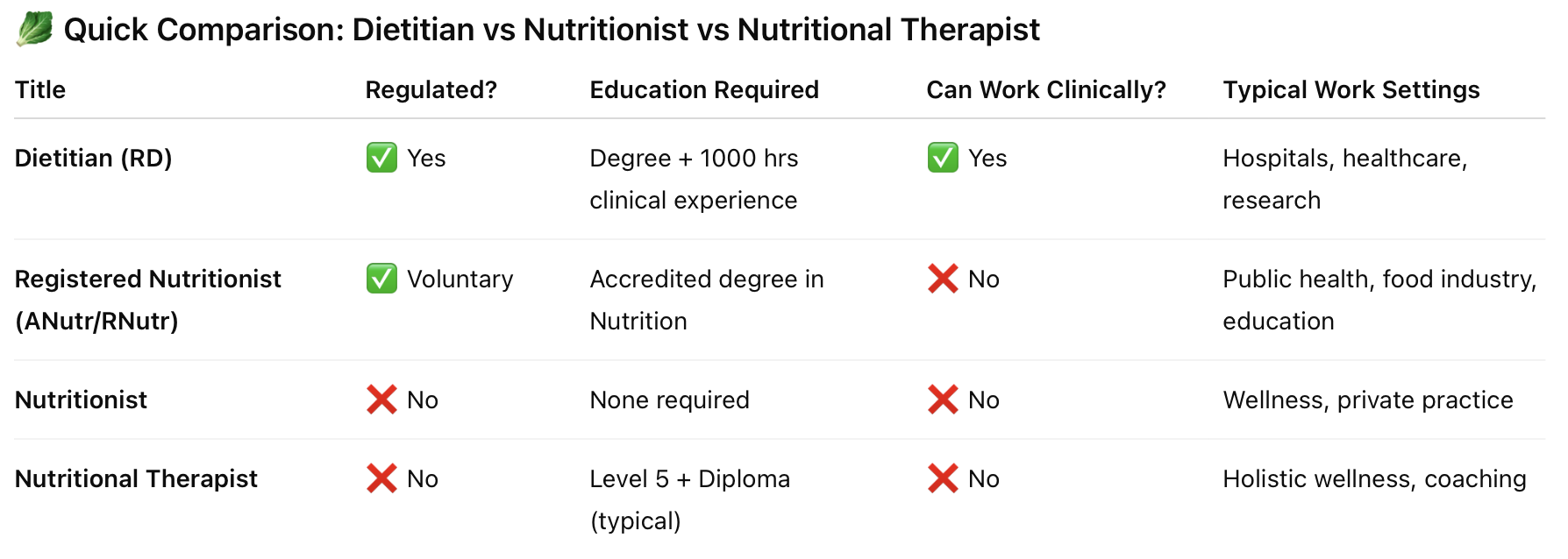Dietitian vs Nutritionist vs Nutritional Therapist: What’s the Difference?
If you’ve ever searched online for nutrition advice, you’ve probably come across the titles dietitian, nutritionist, and nutritional therapist — and wondered what sets them apart. With so many “experts” online, it’s easy to feel confused about who’s qualified to give reliable advice.
This guide breaks down the key differences between these three roles, including their training, regulation, and what kind of help they can offer — so you can make informed choices for your health and wellbeing.
What is a Dietitian?
Registered Dietitians (RDs) are highly trained and legally regulated healthcare professionals. The title ‘dietitian’ is protected by law in many countries — including the UK, US, Canada, and Australia.
To qualify, dietitians must:
Earn a university degree in nutrition and dietetics
Complete at least 1,000 hours of supervised clinical practice
Meet professional registration standards (for example, through the Health and Care Professions Council (HCPC) in the UK
Dietitians can:
Work in hospitals, clinics, and healthcare systems to support patients with medical conditions such as diabetes, heart disease, or digestive issues
Contribute to public health programs, research, and policy
Provide personalized, evidence-based advice on diet and lifestyle
👉 In short: Dietitians are the only nutrition professionals qualified to diagnose and treat health conditions using food and nutrition.
What Is a Registered Nutritionist?
Registered Nutritionists (known as ANutr or RNutr) are also qualified professionals with an accredited degree in nutrition.
They are registered with professional bodies such as the Association for Nutrition (AfN) in the UK or the Academy of Nutrition and Dietetics in the US.
ANutr (Associate Nutritionist): entry-level practitioners
RNutr (Registered Nutritionist): after 3+ years of experience
Nutritionists typically work in:
Public health, education, or policy development
The food industry, corporate wellness, or research
Unlike dietitians, nutritionists cannot work clinically with patients unless they hold additional medical or dietetic qualifications.
What About the term “Nutritionist”?
Here’s where things get tricky: in many countries, including the UK and US, “nutritionist” isn’t a protected title.
That means anyone can call themselves a nutritionist, regardless of training or experience.
So before taking advice, make sure to check that your nutritionist:
Has a recognized qualification in nutrition or dietetics
Is registered with a reputable organization
Provides evidence-based recommendations, not just personal opinions
What Is a Nutritional Therapist?
Nutritional Therapists focus on holistic wellbeing, looking at diet, lifestyle, stress, and digestion to improve overall health.
While they’re not legally regulated, many complete training that meets the National Occupational Standards for Nutritional Therapy (often equivalent to a Level 5 diploma or higher).
They may choose to register voluntarily with: FHT – Federation of Holistic Therapists, CHNC – Complementary and Natural Healthcare Council or GRCCT – General Regulatory Council for Complementary Therapies
Nutritional Therapists are not trained to diagnose or treat medical conditions, but can offer personalised lifestyle and nutrition plans for general wellness.
Which Professional Should You See?
If you need help with a medical condition or want clinical nutrition advice, always choose a Registered Dietitian.
If your goal is improving general health, fitness, or lifestyle habits, a Registered Dietitian, Registered Nutritionist or qualified Nutritional Therapist can offer valuable guidance.
No matter who you choose, check their credentials — a little research ensures you’re getting safe, science-based advice from a trusted professional.


